
|
Vol 75 |
Page 12 |
Privacy Policy | Editorial Policy | Profit Policy | Join the Association | List of Members | Contact us | Index | Links
Back Go to page: 1 2 3 4 5 6 7 8 9 10 11 12 13 14 15 16 17 18 19 20 Forward
Contents:
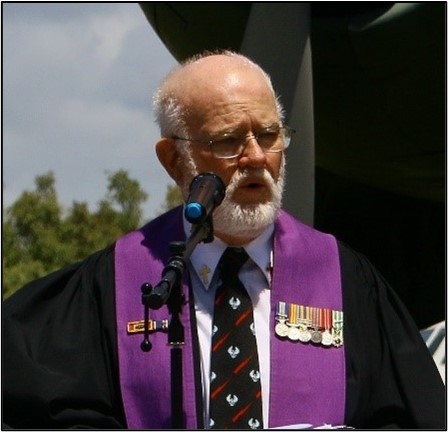
Arthur's Articles.
RAAF School of Languages
Annette and I were married in the Silkstone Baptist Church in Ipswich on Saturday, 19th December 1964, attended by my sister, Glynis, Elizabeth Giles, later Worthington, who we connected with again some forty years later, my mate from the Grange in Brisbane, Douglas Armstrong as my best man and Anthony (Mario) Lanza from my Last unit At Amberley, 16 ALA, my groomsman. Our Junior Flower girl, Jennifer Peterson, whose father, Rex, an RAAF Engineering officer, sang at our wedding and Annette’s nephew, Wayne Neuendorf as Page Boy, rounded out the wedding party.
After a short honeymoon down the Gold Coast at Tallebudgera, we packed our eight-month-old Morris 850 sedan, complete with a roof rack, to the gunnels, with all our worldly goods inside, and on top, mostly wedding presents, and headed for Melbourne, in readiness for my first day in the classroom in January 1965 to begin aa new career, that of becoming a Vietnamese language Interpreter in the RAAF. The Mini boiled going up Cunningham’s Gap and then on every small rise between Ipswich and Werribee. But we made it after a few days, without seizing the engine.
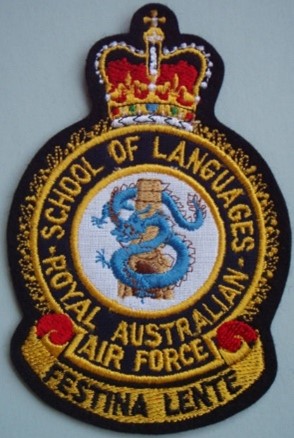
My friend on my recruit course, Des Memen, had married a West Essendon young lady, Kathleen Evans, and was posted to RAAF Base Tottenham as an Equipment Assistant. We resided with Des and Kath and their little son, Michael, at Werribee, just above a ford in Werribee. Des had booked a rickety old wooden house in Werribee out near the Werribee Racecourse, for us.
My Vietnamese Course was meant to be a ‘live-in’ course with evening tutorials. I shared a room on the base with four of my classmates, but I never slept in my bed, for which they were thankful for it became a ‘spare bed’ when they entertained friends of a weekend! If we had an evening tutorial, I would attend, then skip home to Werribee to a comfortable warm bed.
There were seven students in the Vietnamese class, (Number 5,) that year. An Army Sergeant, an Army Corporal, three SAS Regiment Troopers, a New Zealand Army Captain, Tom Turner, and me, the only RAAF member. Tom, like me, preferred to live out in Werribee. We travelled to School together, driving alternatively. This left one car at home with our wives. Tom’s wife, Cynthia, had a Driver’s Licence. Annette had a Learners, so Cynthia encouraged Annette to earn her Licence by practicing both on the road and in our rather large back yard at Werribee. I would leave cardboard boxes in the back yard before I left for School indicating where cars may be parked. Annette practiced reverse parking until she was proficient. She soon became so confident a driver that she tackled her Driver’s Licence test at Werribee Police Station, some weeks before our first daughter, Leanne, was born. She has always claimed that the kind policeman kept her test very simple and gave her a licence to avoid our daughter being born at the Police Station!
After the formalities of being ‘marched in’ to an RAAF School, where we had more Army and Navy members than RAAF, we began our studies in earnest. In 1965, we had two RAAF students on the Indonesian course, two on the Chinese course, one the Thai course, with me being on the Vietnamese course.
Our Commanding Officer, Wing Commander Toby Garrick, was in his last years as the very long time CO of Language School who aspired for a 100% success pass rate from all 1965 students. Toby was a native speaking Russian linguist when the school had opened at the Coogee Bay Hotel, in Sydney, during the Second World War with Japanese and Russian as its only two languages.
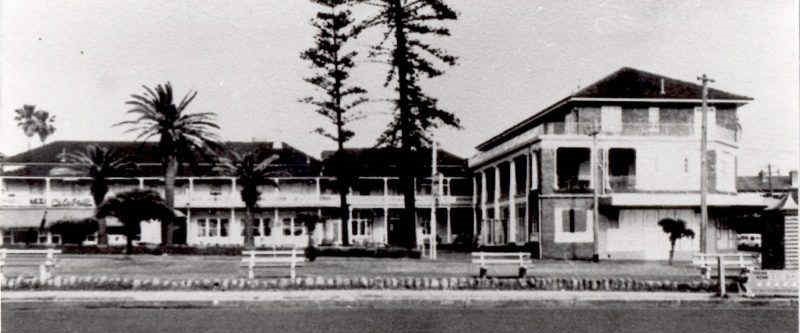
Toby Gabriloff was an RAAF Corporal with a good command of the Russian
language. This following section is only hearsay, but the story was
passed down year by year, that when Corporal Gabriloff was interviewed
for the position of Russian lecturer, then CO of the School, the board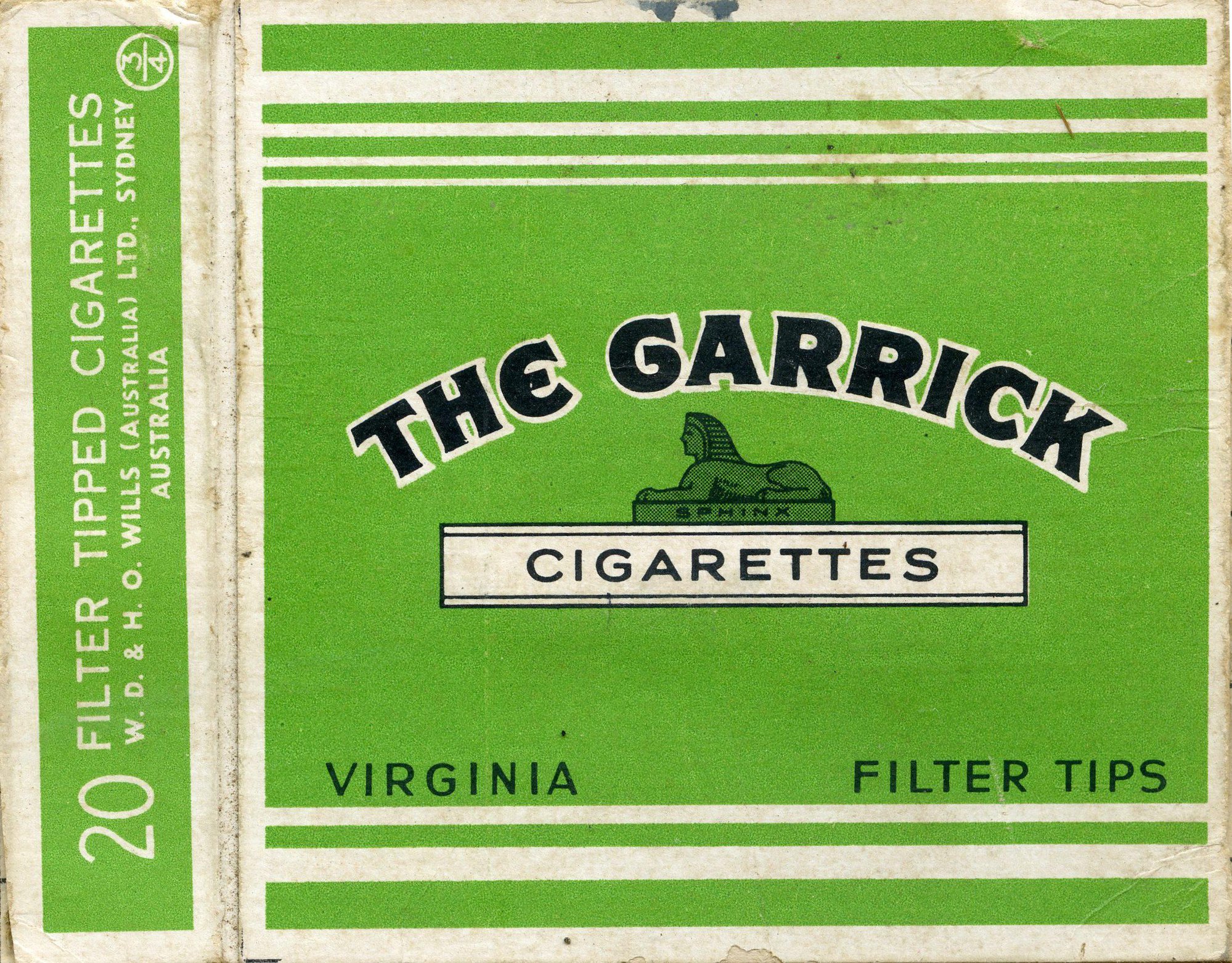 suggested he take a non-sounding Russian name. He put his hands in his
pocket, and pulled out his cigarettes, as the story goes. Corporal Toby
Gabriloff walked out of that board interview as the intended Commanding
Officer of the RAAF School of Languages as Flight Lieutenant Toby
Garrick! He became the longest serving CO of LANGS. And may I add, a
very personable gentleman.
suggested he take a non-sounding Russian name. He put his hands in his
pocket, and pulled out his cigarettes, as the story goes. Corporal Toby
Gabriloff walked out of that board interview as the intended Commanding
Officer of the RAAF School of Languages as Flight Lieutenant Toby
Garrick! He became the longest serving CO of LANGS. And may I add, a
very personable gentleman.
Toby did achieve his ambition by having a 100% successful graduation by all students in 1965 in his final years as Commanding Officer of the School he had led for two decades.
The study year consisted of being taught in the classroom, with many hours in the language laboratory, and evening study at home and for the others, in their quarters. Again, another innovation by Toby Garrick, the language laboratory, known as the ‘lang lab’ consisted of two labs with a control room in the centre. Each lab a dozen booths, with a panel in front of each student in an enclosed space. Each panel was connected to a recording machine in the ‘workshop’.
Each class had a specific program on aa 5-inch tape connected to a
student’s panel. The idea was that the student heard a sentence in the
language of his sought tongue, then when it finished, he or she, would
hit a bar, the master machine would reverse itself, and the student
would repeat what he or she thought they heard. Then they would hit the
play button, the machine reversed direction again, and the student heard
what they had recorded.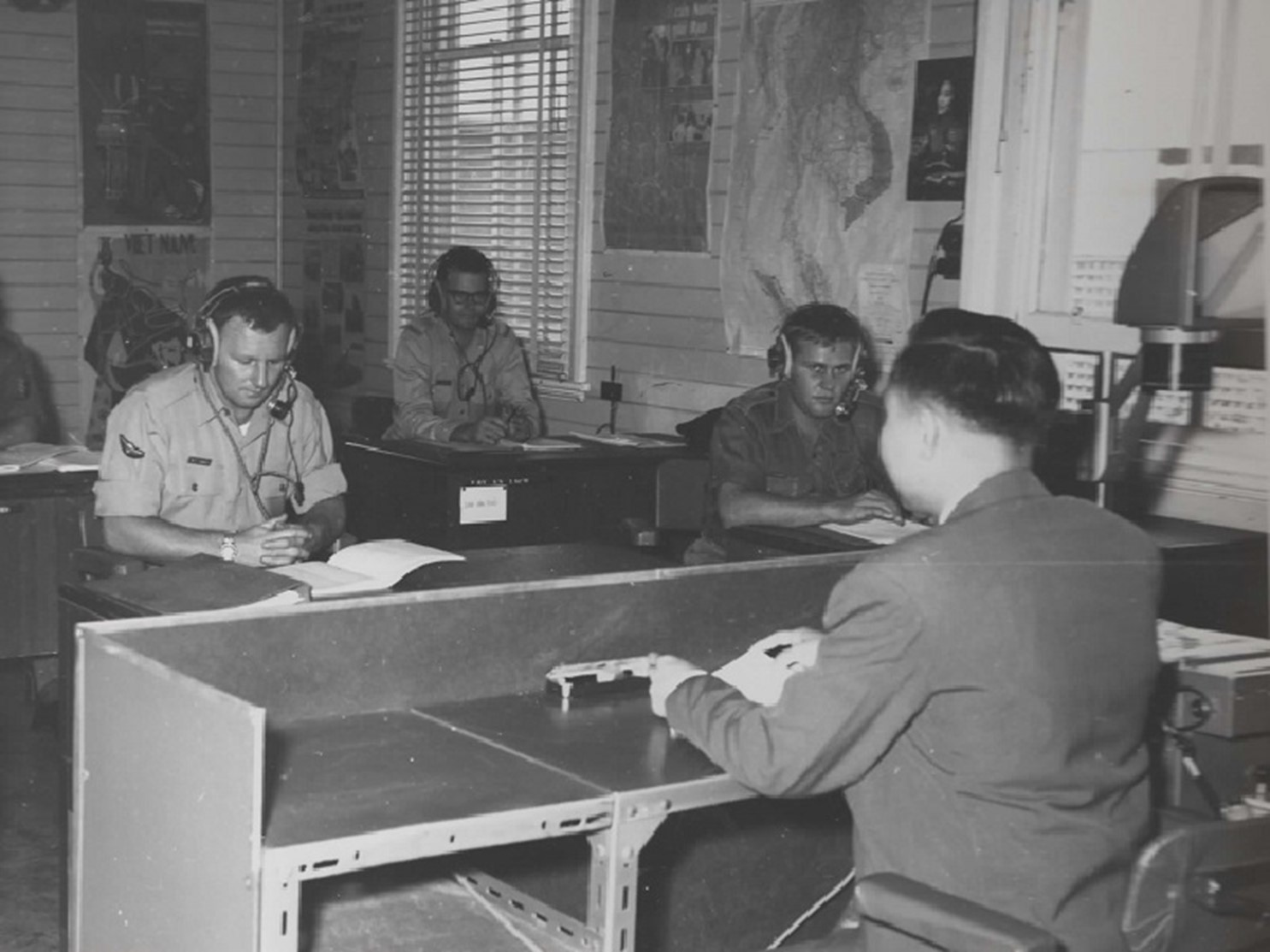 Then they would hit the play bar as the machine again reversed, to hear
what they were meant to say! This sequence was repeated until the
student was satisfied that they had repeated the original sentence
correctly. The Lecturer would monitor the entire class in turn to
correct wrongly spoken sentences or to catch any who were ‘goofing’, for
the student never knew when the Lecturer would be monitoring them.
Then they would hit the play bar as the machine again reversed, to hear
what they were meant to say! This sequence was repeated until the
student was satisfied that they had repeated the original sentence
correctly. The Lecturer would monitor the entire class in turn to
correct wrongly spoken sentences or to catch any who were ‘goofing’, for
the student never knew when the Lecturer would be monitoring them.
The Vietnamese Language Classroom in 1965
In the classroom, after formal instruction in the set situations presented to the student, we were tested regularly in the areas of understanding sentences known as ‘comprehension’. We would also be tested in mock translations on a one student to two instructors, one only speaking the language being learned, and the other only speaking English. As in the real time situation, if the student messed up the translation, the teacher would carry on with the mistaken translation until the three participants were so confused by the wrong direction the conversation was taking that the test would be terminated. That was bad! Later, when I became a Lecturer, winding up the creek, not knowing where this conversation was going, became very interesting, but as you can see, had a real-life situation become so bogged down, none of the participants would have the correct message from the interpreter. That was fun! But not good towards a successful graduation!
Many laughable issues occurred during the twelve months course. In the early days of the course, we were being taught sounds and tones, for these were compulsory to grasp before we could imitate a native speaker. The vowel ‘O’ was spoken in three different mouth movements, as was the ‘a’ sound. I was fortunate enough to be able to describe to others how you held your mouth, lips, throat, and nose to make the sounds not used in English. For this gift, I was chosen to teach future courses in the early stages of sounds and tones.
Mrs Le Van, a lovely Vietnamese lady teacher, was teaching us one of the three ‘O’ sounds. The rest of the class, other than Tom and me, had been out on the town the night before. As Mrs Le Van went around the class pointing to each student in turn, she came to one of those who had been out late the night before. He had his teeth on the desk, a tin wastepaper bucket between his knees, and as she pointed to him, he suddenly and loudly filled the tin bucket with leftovers from his night out, accompanied by an unearthly vocal sound. Our wonderful lady teacher simply said, “Khong dung”. (Not correct!)
We had three native speakers, as teachers. Mr Kevin Luc, known as LICV (, Lecturer in Charge – Vietnamese.) Mr Duc (LVD.) Mrs Le Van (LVP) and Flight Lieutenant Greenaway, a student from a previous course and RAAF Navigator, with the nomenclature, (LVG). After graduation, when I became a lecturer, I was given the designation LVQ. I never challenged it because ‘LVF’ for Fry, LVP for my Vietnamese name, Phai, was taken and coming from Queensland, I thought that ‘Q’ connected me with my State. When I left the Vietnamese Department several years later, I asked why I was afforded the classification ‘LVQ’ and was told ‘Queer’, when that word didn’t hold the same connections and meaning that it does now.
Before you understand this next paragraph, a lesson in Vietnamese.
‘You’ in English has many words in Vietnamese. If I am speaking to a
man, formally. I call him ‘Ong’ (Om,), informally, ‘Anh’ (Ang), To a
lady (married,) formally. ‘Ba’ (Bar,) informally, ‘Chi’ (Chee), to a
young girl, formally, ‘Co’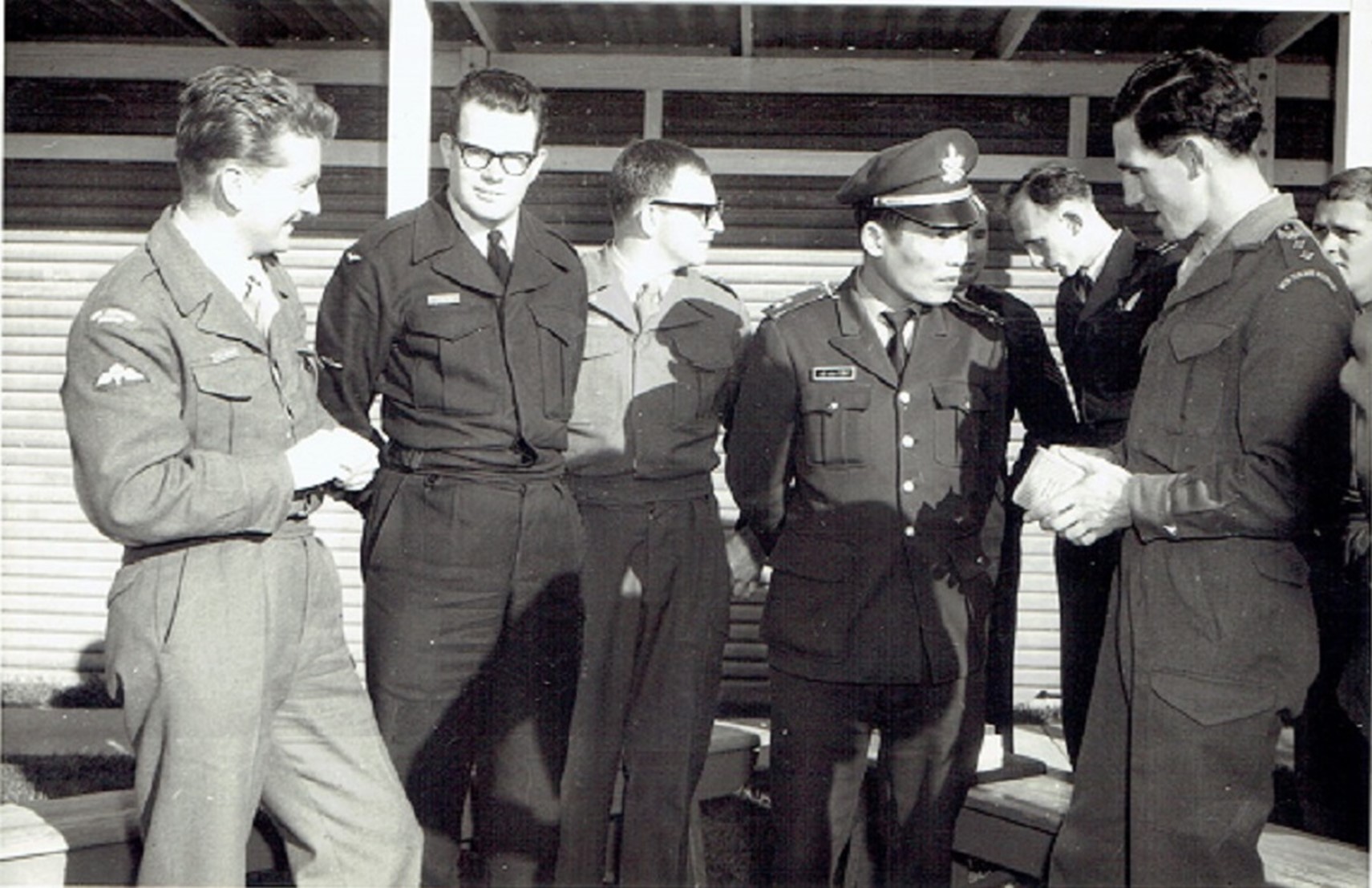 informally. ‘Chi’ (Chee. Only to my wife, ‘Em’. To a lower life
person, ‘No’ (Nor), to a Prisoner of War ‘Han’ (Hun), but to a man of
higher ranking, ‘Thua Ong’ (T-hoo-ar) Om). Now my yarn. During the
school year, Kevin Luc was addressed by all students as ‘Ong”. When I
graduated in the December and was working in the Language Laboratory,
Kevin took me aside and, “Anh Phai, you may now call me ‘Anh’ “.
informally. ‘Chi’ (Chee. Only to my wife, ‘Em’. To a lower life
person, ‘No’ (Nor), to a Prisoner of War ‘Han’ (Hun), but to a man of
higher ranking, ‘Thua Ong’ (T-hoo-ar) Om). Now my yarn. During the
school year, Kevin Luc was addressed by all students as ‘Ong”. When I
graduated in the December and was working in the Language Laboratory,
Kevin took me aside and, “Anh Phai, you may now call me ‘Anh’ “.
The South Vietnamese Ambassador speaks with
Vietnamese language students at Point Cook
I had never heard a person called ‘Thua Ong’, until the South Vietnamese Ambassador to Australia visited our School. Mr Duc, who had applied to extend his tour of duty in Australia, addressed the Ambassador as ‘Thua Ong’ every time he spoke with him.
We did not socialise with the native Vietnamese lecturers during the course except for one night that Mr. Duc invited us to his Married Quarter in Laverton when his wife prepared a delightfully traditional Vietnamese meal. It was my first introduction to true Vietnamese cuisine, but certainly not my last. After dinner, as the seven course members plus Cynthia and Annette crowded into the lounge room to watch television, Mr. Duc complained about having only one channel, which was Channel Nine. With that, one of the students jumped up and changed the channel, and to Mr Duc and his family’s delight, they then had a choice of three more channels, the ABC, and Channels Seven and O, later, Channel 10.
Another memory, Tom and Cynthia Turner’s son, Tommy, had been taught a little Vietnamese by his father. When asked in Vietnamese a certain question, little 3-year-old Tommy would answer in Vietnamese. Yet when asked the same question in English, little Tommy would answer in English.
On the 5th of December 1965, our families, including my wife, Annette, and two-month-old daughter, Leanne, joined with all graduates from the 1965 courses to see us receive our graduation certificates. I had come second in my course with a high Credit. I had enjoyed the study, and the acquisition of the language. Mr Luc had been a Viet Minh and so spoke with a Northern accent, which all the class were taught although with a little thought, I could do a quick transposition and transfer to Southern accent. When in Phan Rang, a year or so later, I could adapt to Central dialect with a little concentration. This proved to be interesting when I later went to Vietnam, and my northern accent caused much consternation among the southern and central Vietnamese locals as to where my allegiances lay.
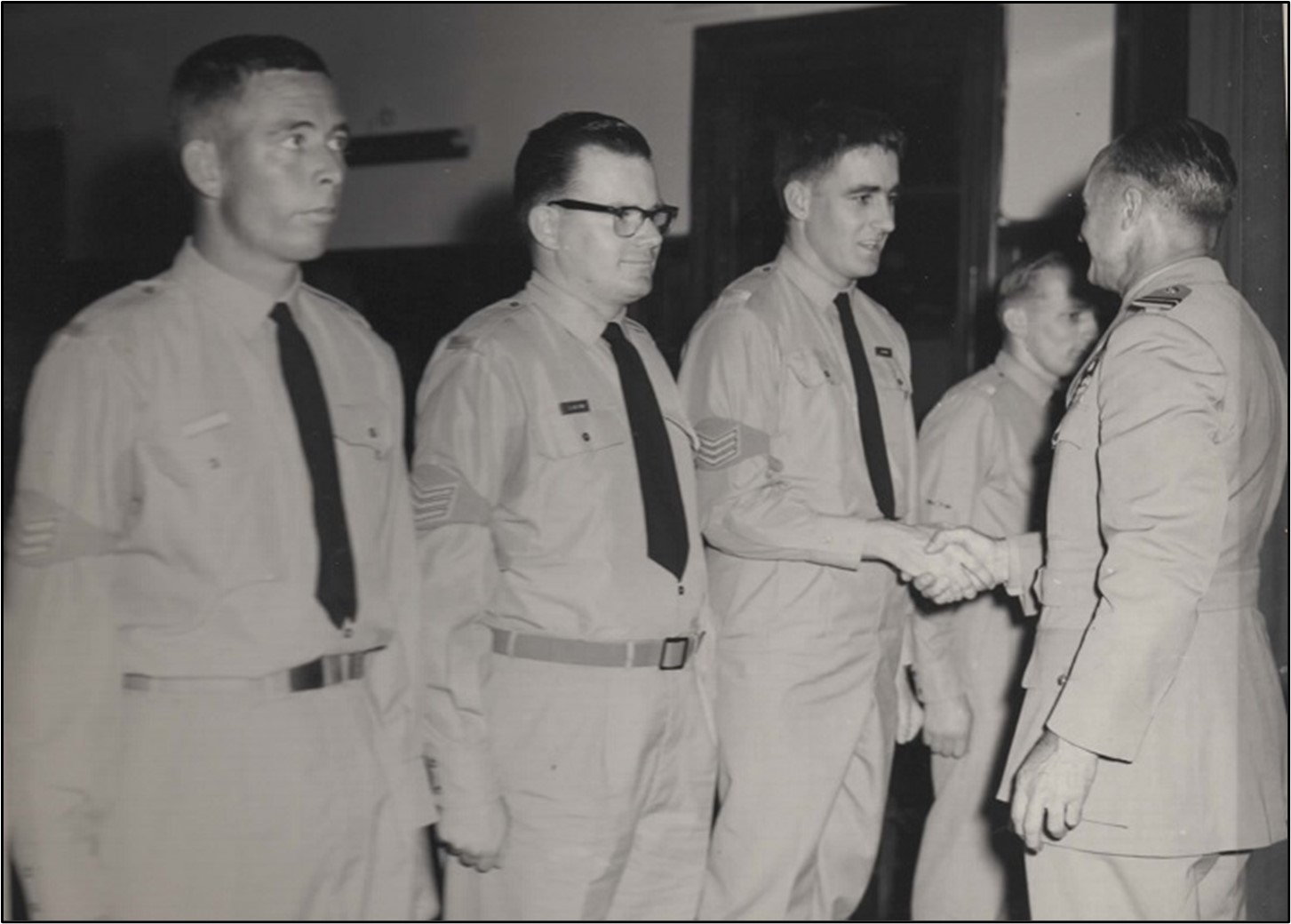
But graduation day also held a further prize for the six RAAF graduates. Peter, Ted, Ian, Ned, David, and I had three stripes strapped to our sleeves. The six of us became Acting Sergeants, a tradition which ceased with the 1967 courses.
Four of the six new LAC / Acting Sergeant Linguists
The newly arrived back at Language School, Flight Sergeant Ray H, a former student in the Chinese Department, took the six new Sergeants into the Sergeants’ Mess to introduce them to the Mess members. I had the honour of being the youngest member of the Sergeants Mess at age 23.
My mother-in-law was staying with us at the time. She was a lovely lady with a wicked sense of humour especially when armed with a sewing machine, for she had stitched my pyjama pants together at the legs when she accessed my suitcase before our wedding. As I readied for bed that night of my graduation, I noticed that she had been active on her sewing machine that day, as I had three stripes attached to my pyjama shirt and when I pulled on my dressing gown, three stripes appeared on the right sleeve!
So ended a long year of study, day, and night, but the rewards were well worth it as I stood on the verge of a totally new career, which would take me to many places, and introduce me to a different part of the RAAF operations.
Prior to graduation, my posting had come through as an ‘A’ grade posting to RAAF School of Languages. New Sergeants Peter and Ian were also afforded the same honour, while the others were whisked off to different areas where their newly acquired talents were required. Monday, 8th December 1965 saw me front up at Headquarters at Language School which was situated in front of Transport Section on the beach front at Point Cook, to be told, “Fry. (and Ian,) – Lang Lab.” We were soon hard at work in the Language Laboratory.
Except for the occasional sessions when I was rostered to sit in the lecturer’s console in the Lang Lab to monitor the students’ imitation of the selected sentences they had heard in their new tongue, I spent in the Lang Lab workshop, preparing tapes to listen to while students were in the Lang Lab for all languages taught at the school which included in those days, Indonesian, Malay, Vietnamese, Chinese, Thai, French, Tagalog (Filipino.) and Pidgin English for those awaiting posting to Papua New Guinea.
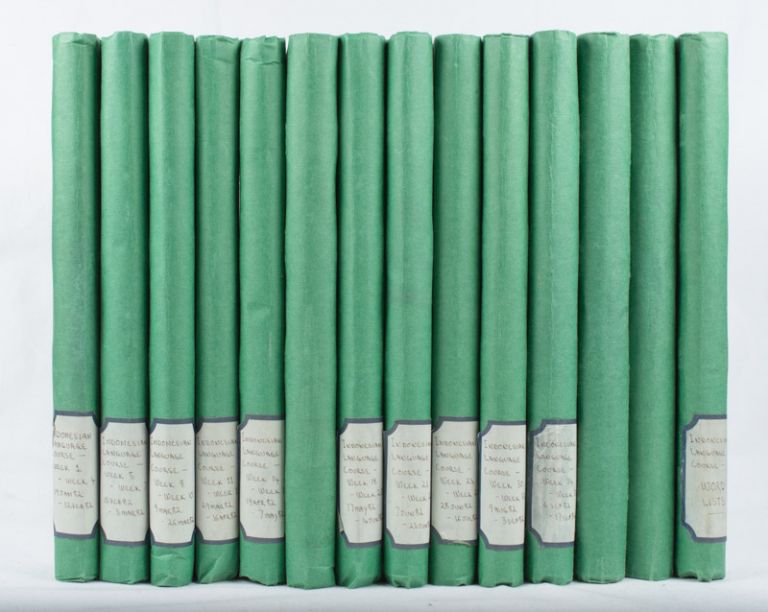
We also had to prepare tapes for students to take back to their quarters to study and practice during the evening. It was a full-time job and neither of us had time to literally scratch ourselves. Sometimes the students would come to us at the end of lectures and ask for the tapes that they had requested. If I had not had time to prepare their request, I would tell them I had been too busy. One smart Indonesian student said, “Then I must teach you to say ‘Too busy’ in Indonesian. He taught me, “Saya sangat bodoh sekali!” That soon became fluent after a few repetitions, so that whenever the need arose to tell a student that I had not had time to prepare their tapes, I would blurt out in understandable Indonesian, “Saya sangat bodoh sekali.” To which I would receive an understandable nod of their head. One day a student asked me if I knew what I was saying, and I told him, “I am very busy’. He retorted, “No, I am very stupid!”
As I have said, Toby Garrick was a very affable fellow who always addressed me as ‘Lad’. He came over to the Lang Lab one day and said, “Lad, I have a very special job for you.” Toby had a desire to experiment with hypnopedia, studying a foreign language while asleep. He told me what he wanted and how to prepare the accessories for this new adventure. I cut out holes in two foam pillows to hold speakers, which in turn were connected to tape players, which I had set to come on at various times during the night. We had two Colonels who were studying Indonesian on a short colloquial course prior to taking up appointments in Indonesia, who Toby had selected as ‘guinea pigs’, so to speak, for this experiment. The night classes started with a small amount of fanfare. Toby’s ‘Lad’ had it all under control.
Several weeks into the experiment, we had a review. The two Colonels, the Commanding Officer and me. One Colonel said he felt he had a better grasp of the language, the other said he had become more confused than ever. Toby suspended the experiment as we were unable to reach a conclusion on the success or otherwise of his hypnopedia experiment. I collected the associated hypnopaedia gear, including the carefully carved out foam pillows, and put them in the Lang School storeroom where I suspect they still are to this day!
While I was on course, and as I did not have an ‘A’ grade posting, and as a newly married airman, I sat at the bottom of the Airmen’s Married Quarters waiting list. I was fortunate to draw Temporary Rental Allowance during my time on course. Then as a freshly promoted Senior NCO, I rapidly rose to the top of the Senior NCO’s Married Quarters waiting list. In early January 1966, I was offered a Married Quarter, a new place, in Creswick Street, Laverton. Another newly promoted ex-LAC, now Acting Sergeant, Peter, was also offered, and accepted, a newly built Married Quarter in the cul-de-sac opposite my new abode. Annette and I moved in with our three-month-old daughter and bought scatter rugs as there were no floor coverings, and although it had a carport, the surrounding yard need a lot of attention. As in most new Married Quarters, we soon had a lovely bloom of ‘RAAF Roses’ (geraniums,) on display.
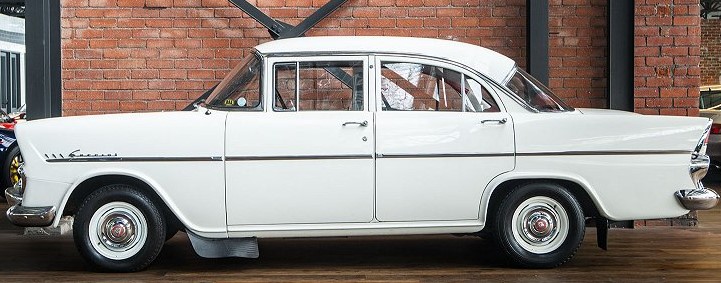
Flight Sergeant Ray H was given a Married Quarter just around the corner from us in Bladin Street, the main drag in Laverton. His wife, Margorie, became good friends with Annette, as they shared a common interest, shopping. Ray and I shared the driving to school as we both had immaculate FB Holden sedans, mine all white, his was white with a yellow strip on the sides. In early 1966, Ray was commissioned as a Pilot Officer. We served together occasionally but communicate regularly since our retirement, some thirty-five years ago, and hope to catch up again once Covid is over.
Life was good. I relished the work in the Lang Lab and my occasional stint behind the tutor’s console as LVQ. I knew I was next Linguist to head to Vung Tau, but the 1964 Vietnamese language course RAAF student had just started his tour in Vietnam so my posting there should be/could be just on twelve months away. Then in November 1966, Australia’s Prime Minister, Harold Holt, had made a statement that included the immortal sentence, ‘All the way with LBJ,’ as well as announcing that an RAAF bomber squadron would soon be deployed to Vietnam, although the site in Vietnam was not announced.
Annette was four months pregnant with our son. We all assessed that it could well be that as the next Vietnamese language interpreter to be posted to Vietnam, I was surely ‘the pee’ to be sent with the bombers. One day when Annette was waiting outside the school to collect me, Toby Garrick approached her and assured her that although he was about to go on holiday, he had left word that I was not to be posted to Vietnam until the baby arrived, expected to be in April 1967. Annette was assured that as Toby spoke, so it would always be.
In December that year, even the announcement that two of the 1965 graduates at the school had been elevated to the rank of Substantive Sergeant, (Peter, and me,) could not obliterate the fact that my posting to Vietnam was also announced. I was going to an unknown destination in Vietnam with Number 5 Airfield Construction Squadron. Detachment ‘B’, as of Australia Day 1967.
When Toby came back from holiday, he came to Annette and apologised profusely saying he had left orders that ‘The Lad’ was not to be posted to Vietnam until the baby was born. Finally, someone in Canberra overruled my good friend and mentor, Toby Garrick.
Soon, as Annette had decided to go home to Ipswich to spend the last of her pregnancy with her mother, and have her mother present to assist with the two little children, we quickly vacated our Married Quarter in Laverton, put the few goods and chattels we owned into storage, including our scatter rugs we had used as floor coverings on bare floors, and we set out with our new FB Holden, packed to the gunnels just as we had come down to Victoria two years earlier, and headed towards Ipswich.
Watch out, Vietnam. Sergeant Arthur Fry is coming, rearing to use his new learned language, ready or not!
A group of women were at a seminar on how to live in a loving relationship with their husbands. The women were asked. "How many of you love your husband?" All the women raised their hands. Then they were asked. "When was the last time you told your husband you loved him?" Some women answered today, a few yesterday, and some couldn't remember. The women were then told to take out their mobile phones and text their husband, "I love you, Sweetheart." Next the women were instructed to exchange phones with one another and read aloud the text message they received in response to their message.
Below are 11 hilarious replies. If you have been married for quite a while, you understand that these replies are a sign of true love. Who else would reply in such a succinct and honest way?
1. Who the hell is this?
2. Eh, mother of my children, are you sick or what?
3. Yeah, and I love you too. What's wrong?
4. What now? Did you wreck the car again?
5. I don't understand what you mean.
6. What the hell did you do now?
7. Don't beat about the bush, just tell me how much you need.
8. Am I dreaming?
9. If you don't tell me who this message is actually for, someone will die.
10. I thought we agreed you wouldn't drink during the day.
11. Your mother is coming to stay with us, isn't she?
Impressive people I met in my Air Force career.
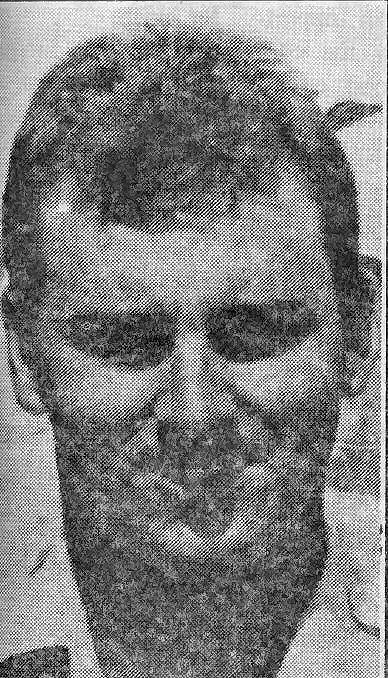
One of the finest young pilots I had the privilege to work with was Mark Fallon, who sadly, was killed in an F-111 crash that took his life and that of his navigator, Bill Pike (right) on 2nd April 1987.
We were at No. 1 Squadron together when we took part in an exercise in 1983 that saw a fleet of F-111s based at RAAF Base Tindal from Amberley. Tindal had been a bare base for years, so it was great news when we lobbed in there as a convenient spot, to fly out, west over Point Keats, then onto Darwin to launch surprise attacks. We had invited several local property owners into the Officers’ Mess in Tindal to meet with us, and they were thrilled that the Air Force was using Tindal again. Reciprocal invitations would have not been exhausted during our stay, or even for several months to come.
After a leisurely day, on the Sunday afternoon, two F-111s took off from Tindal. The lead aircraft‘s exhaust threw a ten-inch nail with bitumen attached, which had been embedded between the concrete on the ageing runway, into the one of the engines of the following aircraft, causing it to shut down. Both aircraft continued to Darwin but were not permitted to return to Tindal.
Next morning, the remaining F-111s flew to Darwin, as well as a Hercules C-130 which took the remaining aircrew and groundcrews to Darwin. The ‘enemy’ for this exercise had suddenly been forced to come and dwell among the ‘good guys’, consisting of the Mirage Squadrons. For the first time in my life, I knew how refugees must have felt, when we found ourselves stranded without knowing where we were to lay our heads that night.
As the wheels of administration slowly turned, we were offered
accommodation in non-airconditioned demountable huts, which did not
appear an attractive proposition. A young lady officer who had come
down from Butterworth for the exercise, Janelle V, had been billeted in
a disused Married Quarter, complete with the all-too-familiar glass
louvres in every room. Janelle said she only slept there, taking all
her meals in the Officers’ Mess. 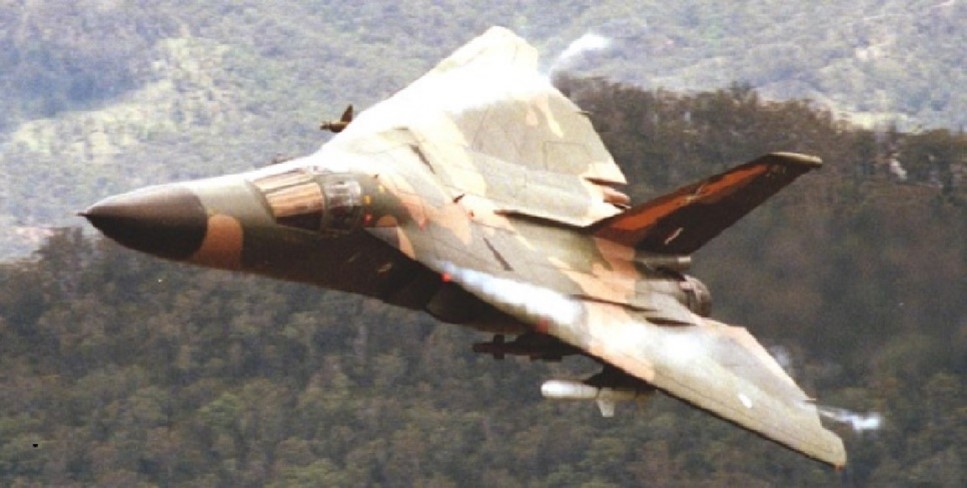 She offered the 1 Squadron pilots and navigators, and me, to share with
her. Janelle had come down to Darwin with her husband, a Mirage pilot,
who was not taking part in the exercise, and was one of my students at
No. 1 Flying Training School where I was the Air Force Law Instructor
for over three years.
She offered the 1 Squadron pilots and navigators, and me, to share with
her. Janelle had come down to Darwin with her husband, a Mirage pilot,
who was not taking part in the exercise, and was one of my students at
No. 1 Flying Training School where I was the Air Force Law Instructor
for over three years.
Mark Fallon, and Karl V, were our F - 111 pilots, with Mark K, and one other were our navigators, who along with me, accepted Janelle’s kind invitation to grab a spare bed in her allotted Married Quarter, now with an imaginary ‘full house’ sign up. I had been on other exercises with these guys, but being ‘refugees’ in that situation, I came to know much more about my fellow members of 1 Squadron who were ‘aliens’ among the ‘good guys’.
Taking advantage of being ‘the enemy within’, we did get up to some disgusting pranks. While walking home to Janelle’s Married Quarter one night, we saw a group of airmen, one without a hat. We stopped them and enquired where his hat was. Not satisfied with his answer, we placed him under close arrest and ordered the other two airmen to accompany him to the guard room and wait for us there. They obliged, and for all I know they could still be waiting for us there thirty-eight years later! As I did point out later, although, a ‘real life’ enemy may not be able to infiltrate a base as we had done, still we managed to put three of our ‘enemy’ out of action for at least a few hours, maybe even thirty-eight years!
Another F-111 pilot, then a Squadron Leader, who in later retired life, gave the RAAF many hours of his Reserve time as a Group Captain (Retired), tutored me to imitate a certain person in the ‘enemy camp,’ to mimic his voice as he had a unique tone when excited, in a vain attempt to scramble his Mirages. We almost succeeded.
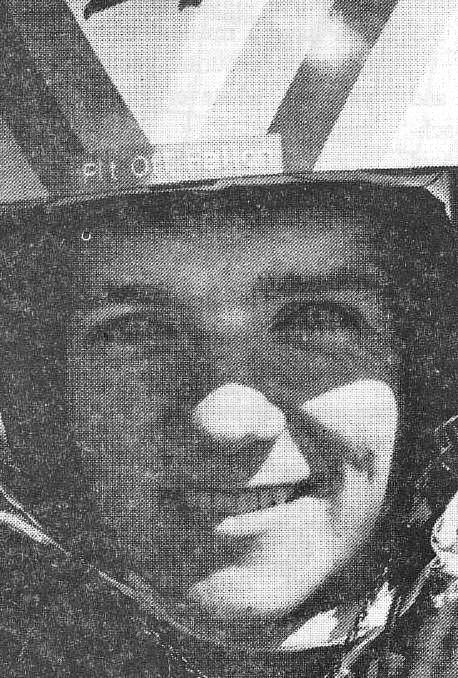
When our son was in his final year at school in Ipswich, and as he had his eye on a career with the F-111s, Mark invited him out to Amberley to spend time with him in his daily routine. Our son, Ash, spent some time with Mark (right), who introduced him to F-111 simulator, which incidentally was the same part of the F-111 that Dave Rogers and Peter Growder had the misfortune to crash on take-off in New Zealand some forty-four years earlier. I had just read Wing Commander Ian ‘Gibbo’ Gibson’s daily history of the RAAF, (which is jolly good read.) just prior to Dave and Peter’s 42nd anniversary of that F- 111 disaster. When I last spoke with Peter, who by the way, both Peter and Dave completed their mammoth Air Force careers as Air Vice Marshals, Peter said that people still ask him if he has finished paying for the lost F-111 yet!
Ian Gibson, who is also a former Radio School graduate (No 92 Telegraphist Course) and an RAAF School of Languages graduate (Indonesian in 1978), from the dim dark past, publishes a daily series of Air Force History items which are emailed to a wide readership. Although this will cease at the end of this year when ‘Gibbo’ finally retires from Air Force after a long career.
When our son finished school, he worked for a bank in Ipswich, while continuing his tertiary studies at night. Mark used to use the bank where he worked, and they continued their friendship when Mark did his private banking. Sadly, medical constraints prevented our son from achieving his dream of becoming part of an F-111 crew member, but he enjoyed a successful career in Royal Australian Electrical and Mechanical Engineers, completing two master’s degrees with the United States Navy’s Post Graduate School in Monterey, California, before taking his discharge from the Australian Army. He and his lovely wife, Joy, who he met in Monterey, and married in Rhode Island, then returned to Australia, for his final posting at Puckapunyal. Upon his resignation, they moved back to America.
Ash gained his PhD in Psychology, which he had started while at Monterey. Annette and I travelled to Dallas, Texas, to see him have his PhD in Organizational Psychology conferred on him. He became an Adjunct Professor at a Michigan on-line College. Ash attributed much of his success to Mark Fallon giving him a ‘gee-up’ when he needed it most. Unfortunately, our much-loved son, Ash, passed away in Boston Medical Center in 2018 at age 51. He had dual Australian – American citizenship, as do his two beautiful daughters, Mackenzie Joy, and Addison Ashley.
Mark made world news when at age 19, he became the youngest teenager in the world to fly the F-111. That, no doubt, gave him his nick name of ‘Speed’. Mark was a thorough gentleman, a good squadron member, as well as an excellent pilot and Air Force officer. In the month before he was killed, I was in the Officers’ Mess at Amberley, then retired. Mark noticed me and strolled across the Mess with hand extended, and said, “Good day, Sir!” I told him, “It’s not ‘Sir’ anymore, Mark, it’s Arthur.” Mark replied, “You will always be ‘Sir’, Sir!” I will never forget his humility with assertiveness, coupled with a few ounces of frivolity.
On the evening of the 2nd of April 1987, Mark and Bill Pike were on a night flight from Amberley to Tasmania and return when they approached the town of Tenterfield in N.S.W. Their aircraft crashed in a paddock alongside the Mt. Lindsay Highway. I am not aware of what happened, but earlier press reports at the time said the F -111 had lost some control, and was in a slow descent, but rather than Mark and Bill allowing the aircraft to continue its descent path and possibly hit the populated township of Tenterfield, they chose not to eject but fought to keep the aircraft away from the populated area. I know that is probably not the official version, but it sounds more like the Mark Fallon I knew.
A cairn has been erected on the Mt. Lindsay Highway next to the paddock where the F-111 crashed. On the cairn’s left side is engraved, ‘In Memory of FLG OFF Bill Pike’, and on the right side, ‘In Memory of FLT LT Mark Fallon.’ Then at the centre of the cairn, is written ‘Site of the crash of F-111G A8-128 2nd April 1987. They died in the service of their country.”
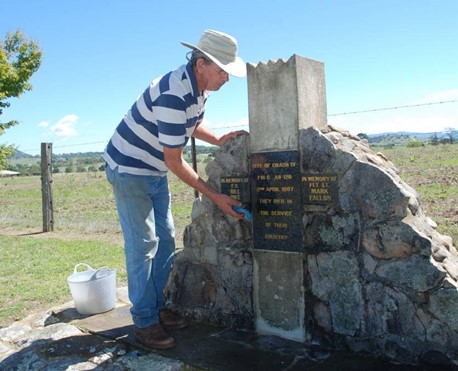
In a TV interview the following day, Officer Commanding RAAF Base Amberley, Air Commodore Bob Walsh said of Mark Fallon, “He truly was an outstanding young man and a brilliant pilot.“ I found him to be all of that and I can add, a great mentor to our son when he needed that little extra spurt on to achieve the brilliant career that he did.

Back Go to page: 1 2 3 4 5 6 7 8 9 10 11 12 13 14 15 16 17 18 19 20 Forward